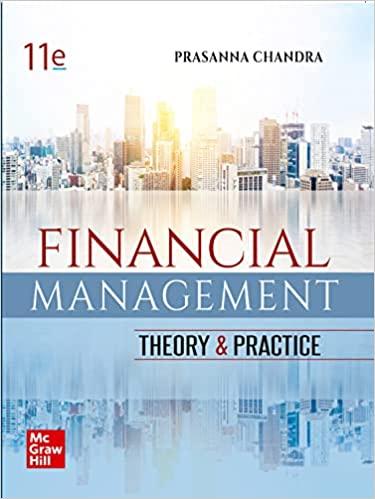Question
Remember that the primary goal of a firm is to maximize shareholder wealth by increasing the firms intrinsic value. It is thus important to understand
Remember that the primary goal of a firm is to maximize shareholder wealth by increasing the firms intrinsic value. It is thus important to understand the impact of distributionsboth in the form of dividends or stock repurchaseson the firms value.
Consider the following situation:
Kathy is a financial analyst in BTR Warehousing. As part of her analysis of the annual distribution policy and its impact on the firms value, she makes the following calculations and observations:
| The company generated free cash flow (FCF) of $87.00 million in its most recent fiscal year. | |
| The firms cost of capital (WACC) is 13%. The firm has been growing at 10% for the past six years but is expected to grow at a constant rate of 8% in the future. | |
| The firm has 21.75 million shares outstanding. | |
| The company has $232.00 million in debt and $145.00 million in preferred stock. |
Along with the rest of the finance team, Kathy has been part of board meetings and knows that the company is planning to distribute $120.00 million, which is invested in short-term investments, to its shareholders by buying back stock from its shareholders. Kathy also observed that, at this point, apart from the $120.00 million in short-term investments, the firm has no other non-operating assets.
Using results from Kathys calculations and observations, solve for the values in the following tables. (Note: Round your answers to two decimal places.)
| Value | |
|---|---|
| Value of the firms operations | $1,740.00 million |
| The intrinsic value of equity immediately prior to stock repurchase | |
| Intrinsic stock price immediately prior to the stock repurchase |
| Value | |
|---|---|
| Number of shares repurchased | |
| The intrinsic value of equity immediately after the stock repurchase | |
| Intrinsic stock price immediately after the stock repurchase |
Based on your understanding of stock repurchases, identify whether the following statement is true or false:
When firms make distributions in the form of dividends, the stock price falls by the value of dividends per share (DPS) distributed, but the overall shareholder wealth does not decrease.
This statement is because if a firm pays a dividend of $1 per share, the price per share of the firms stock will also fall by $1 to any arbitrage opportunities.
Step by Step Solution
There are 3 Steps involved in it
Step: 1

Get Instant Access to Expert-Tailored Solutions
See step-by-step solutions with expert insights and AI powered tools for academic success
Step: 2

Step: 3

Ace Your Homework with AI
Get the answers you need in no time with our AI-driven, step-by-step assistance
Get Started


